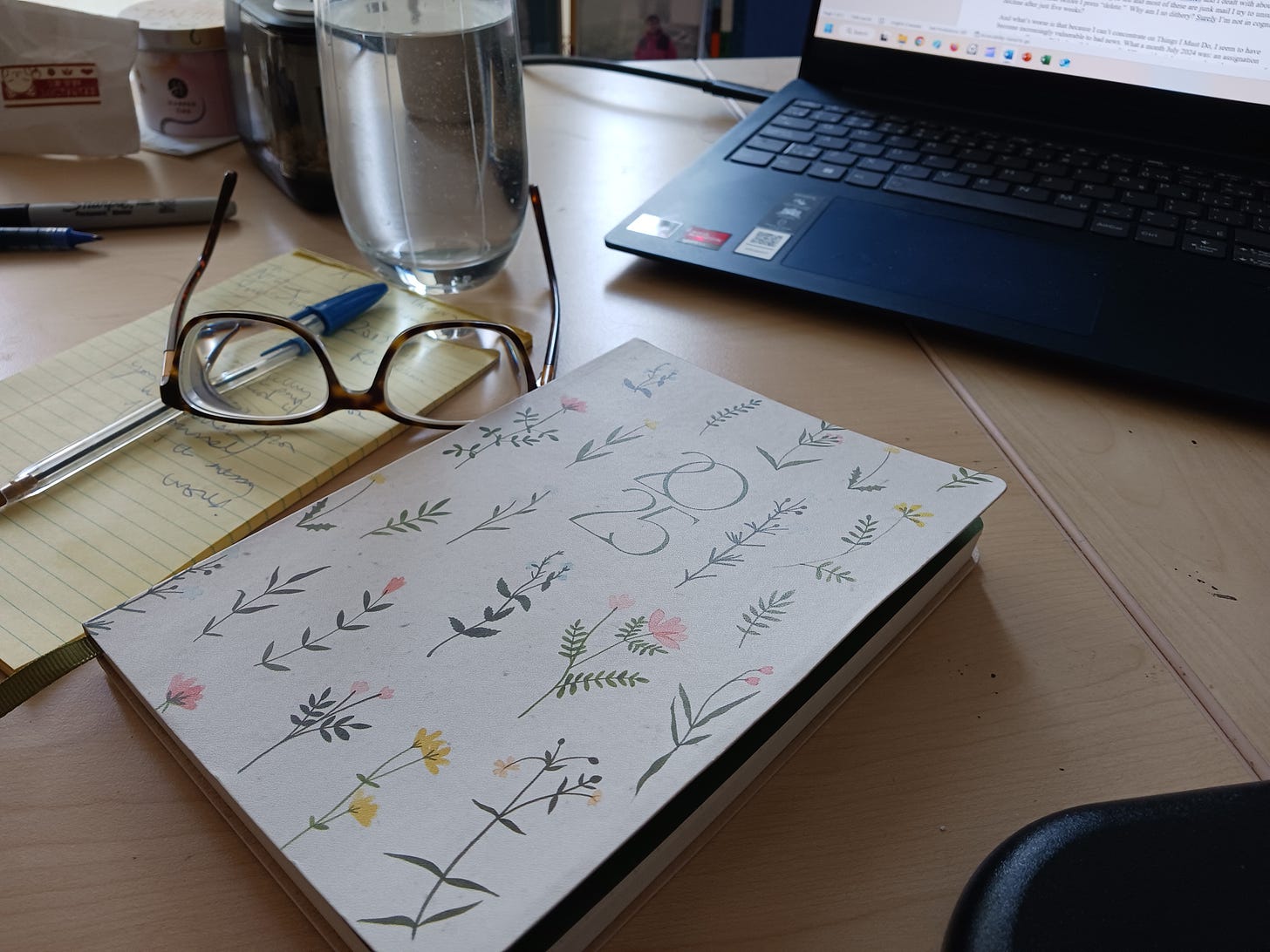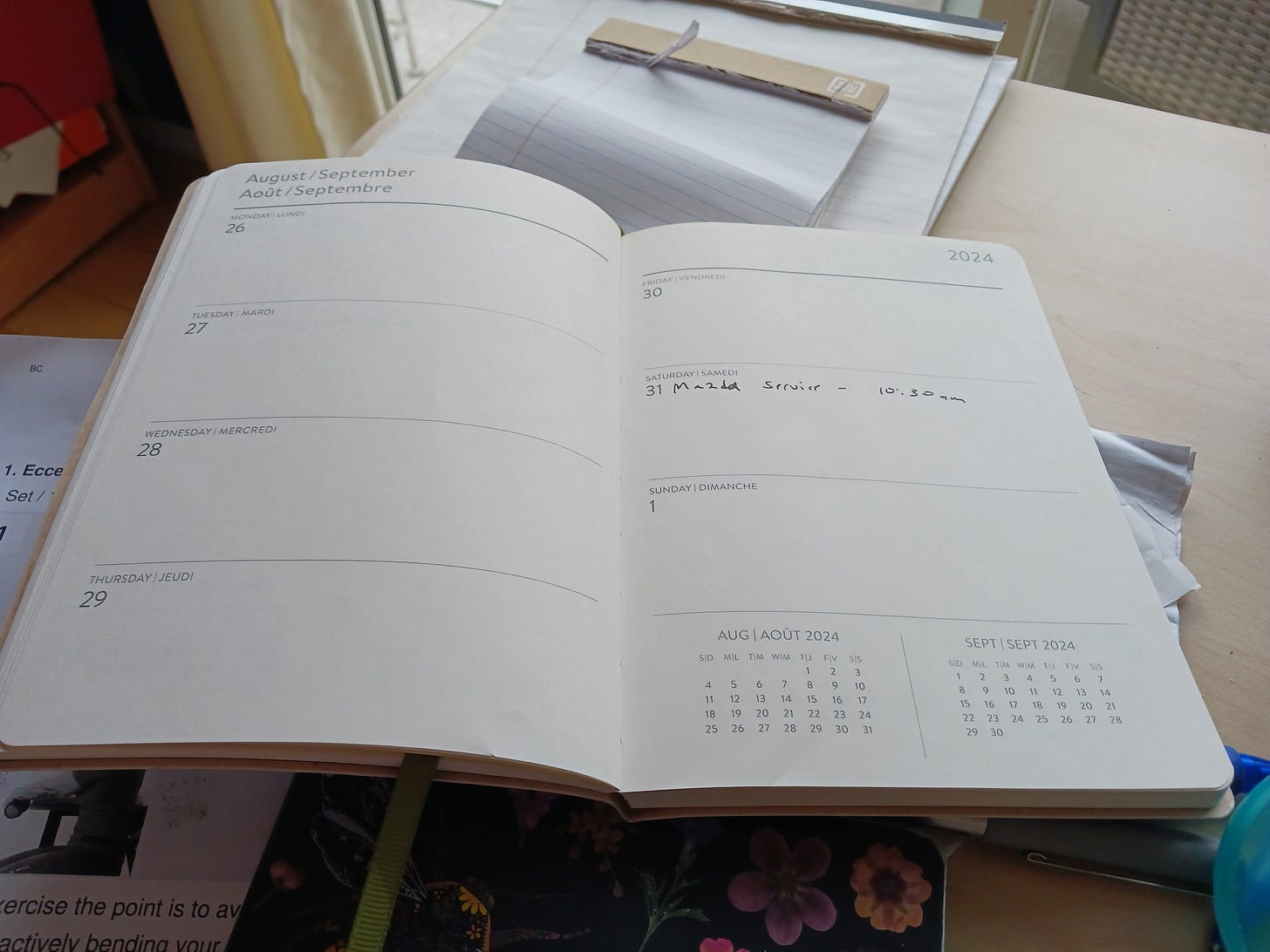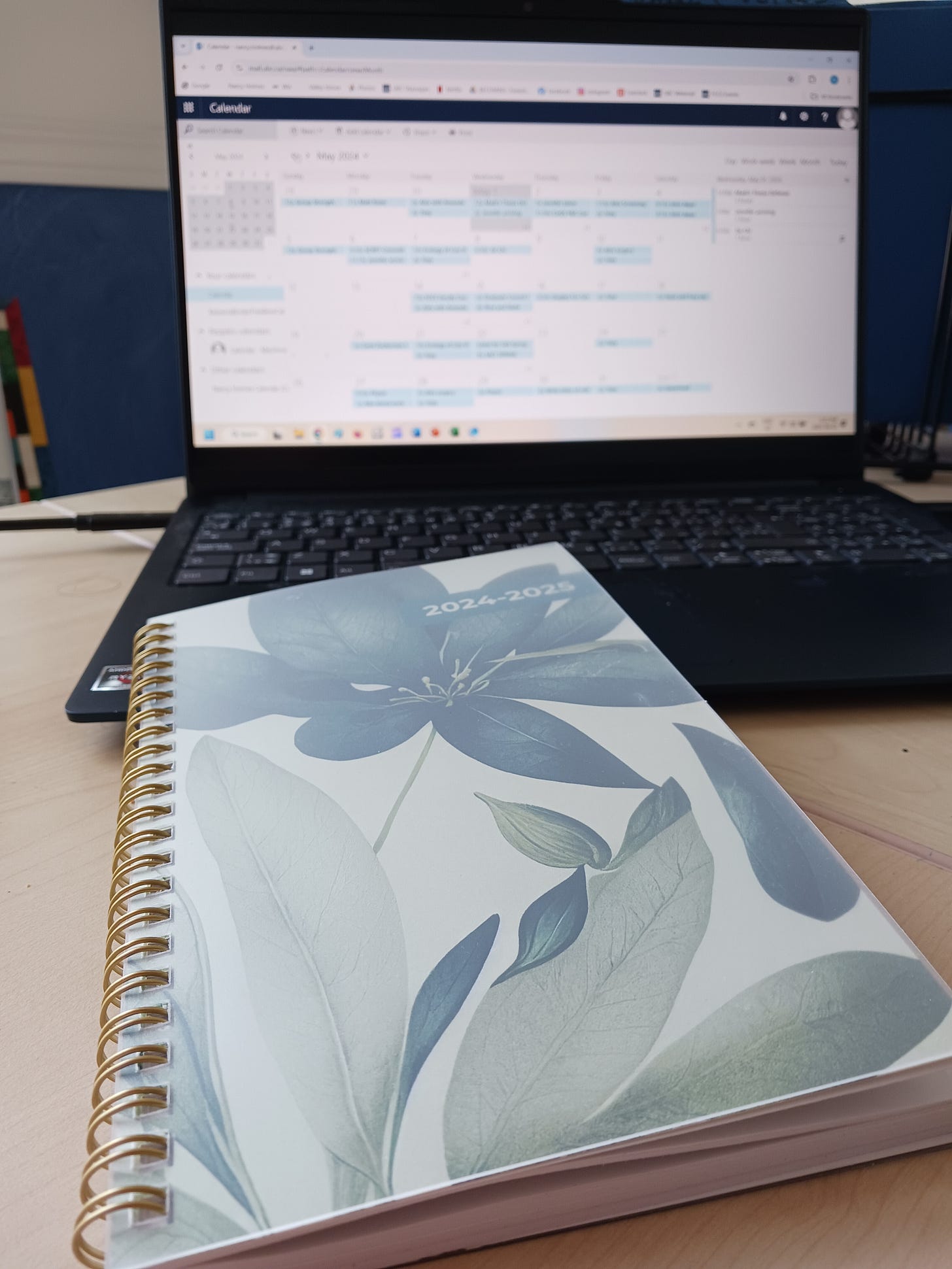This week I bought a day-timer in a grumpy rejection of my smart phone calendar app. I have no idea how to sync the app to my new email address without employer-provided IT support. However, buying a hardcopy agenda was also a desperate attempt to get a handle on my feelings of disorientation and disorganization.
I have been retired a little over one month and in this short time I seem to have lost all my organizational skills. I go to my computer with a glass of water and see that I already have a glass of water at my desk. I take one glass to the kitchen, return to my desk, sit down and realize I have forgotten to bring my reading glasses. Then I need my phone for some hideous dual-factor authentication rigamarole, and I can’t remember where I left it. Soon I give up working on the computer— I don’t really know what I was doing on it anyway—and waffle between splitting the irises or deadheading the cosmos and calendula. And soon it is too hot to go into the garden anyway.
And often the stakes are higher. I worked several hours on a poem last week, revising, editing, finishing it off. I now cannot find that file anywhere on my computer, only the very earliest draft. A few days ago, I visited a friend I hadn’t seen in ages and I completely forgot to bring the little gift I got for her. These feel like serious lapses of basic organizational skills.
How did this happen? I had a busy, demanding job that required juggling all kinds of tasks and deadlines. I used computers competently and never missed appointments. I had a full Outlook calendar with back-to-back entries and I dealt with about a hundred emails a day. Now I get maybe ten and most of these I rarely remember to unsubscribe from before I press “delete.” Why am I so dithery now? Surely, I’m not in cognitive decline after just five weeks.
And what’s worse than losing a poem is that because I can’t concentrate on Things I Must Do, I seem to have become increasingly vulnerable to bad news. What a month July 2024 was: an assignation attempt on Trump, horrid massacres of children in the UK and the Middle East, the second July in the row that has given us the hottest temperatures ever recorded, wildfires scorching and razing western North America including the burning down of the beloved town of Jasper in the Canadian Rockies, an honoured literary icon and Nobel prize-winner outed as a pretty flawed human being. I mean the news is always bad and it can bring anyone down if you spend too much time with it, but every day I feel a little more raw and frayed.
Hence my day-timer. This little book was going to anchor me into my new life. I would become focussed. The book would help me pay attention to the many things I am doing with my newly freed-up time: trip to visit my son, yoga, taking my car in for service, picking up my grandchild after day camp, a doctor’s appointment long postponed, a friend’s book launch, coffee with another friend, aquacises! There: I put all that down in my appointment book. A rich life! Lots to do! And completely organized.
But strangely, I don’t feel organized. The book feels flimsy and complicated. My handwriting is untidy and scrawly. I had expected my book with its hefty deadlines would pin me to time and place, firmly, decidedly. However, rifling through the pages reminds me of my jitteriness and un-rootedness. The book lies open on the desk, staring up at me with several blank eyes- Wednesday, Friday, Saturday. The structure of the book, those nice solid covers, the real paper, my inky scrawls made with my own real hand, were supposed to give me a sense of structure. But the whole enterprise feels sketchy, clumsy, and pretty empty.
And the day-timer project certainly does nothing to filter the relentless, scary news of these dark times. Bad news comes pouring through those many gaping holes. I realize what a deep distraction being organized was: the to-do lists, the priorities, the paperwork, the report-writing, the forms, the meetings, the deadlines. Being organized was a cocoon.
All the self-help books in the world and their countless online equivalents tell me being organized is the way to manage stress, anxiety, mental fatigue, headaches, backaches, depression, weight gain, brain fog, confusion, and the list goes on. When I got my day-timer, I was convinced that the anxiety and brain fog (the only two “symptoms” I am feeling) would be cured once I got back to that blessed feeling of being organized. My newly organized life would re-create the lovely cocooning shield that work was. I’d have a busy bulwark against the relentless bombardment of fear and anxiety that is rippling through the world and that seems to be increasing.
But the book-calendar doesn’t work that way. As I look at my day-timer and its careful notations, all the perfectly correct times for each appointment or outing, I realize that I am not dis-organized at all. I am un-organized.
No work imperatives are offering me direction, goals, and the sheltering arms of distraction in return for my busy bee activity. I have become Unorganized, tossed out into the world, with all my perfectly fine time management skills intact, but my brain and my time floundering with no one telling me what to pay attention to. I have been cast upon the currents of my own self and the chaotic world.
My dithering with the glass of water, the reading glasses, the computer, my more dismaying mistakes, none of that is about being disorganized. I simply am not “being organized” by anyone or anything, no institution, no work plan, no business, no schedule built by someone else. I am experiencing a kind of cognitive teetering towards a life where I am unhoused by any entity but my own life. I have not yet learned how to create my own structures of attention.
Attention. That is the key. The mighty power of attention is now all mine to do with what I will. How safeguarded we are when simply too busy to pay attention to global cataclysms or difficult beliefs or even one’s own chosen life. I have become Unorganized. And I think this may be a good thing. The day-timer isn’t an anchor after all; it is a book full of wind and sails.






What do you expect! After 30 years organizing your work life, you have been set free- aka floundering. I was so anxious about retiring I enrolled in University - needed some structure other than playing golf and bridge.
I bought a Costco sized package of reading glasses and I try to keep a set at every possible work station...and yet inevitably there is never a pair when I need one. I feel your pain :)